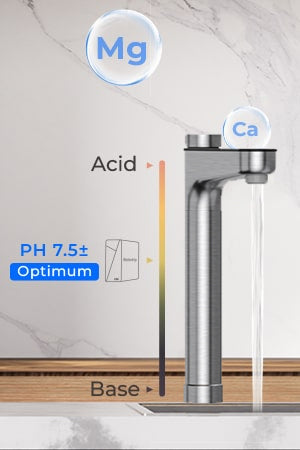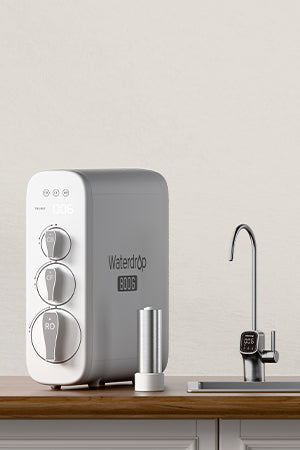CO2 is not pushed into the water during the production of soda. Instead
it occurs naturally.
By manually mixing baking powder, scientifically also
Called sodium bicarbonate, pure soda can be made from pure water. It is not necessary to
that the machine immediately applies strong pressure to add more CO2. You can use baking soda and pure water
to soda. If you want to make lemonade, high-quality water that has been filtered through a
reverse osmosis filter
is filtered , a better taste. Lemonades usually have fewer calories than other sugary
drinks.
After adding sodium bicarbonate we see that the soda has a
large number of carbon dioxide bubbles have formed. However, the carbon dioxide bubbles in the water break at
Room temperature and room temperature quickly and the soda water is refilled in bottles to make a regular
to become a bubble-free drink.
The History of the Soda Club
With the development of chemistry and industry in the 18th century, the
natural mineral water. Originally, more natural mineral water was drunk, which
carbonated gases because it had a unique taste and was supposedly beneficial to health
was.
The invention of carbonated beverages by humans began in 1772, when
The British chemist Joseph Pristle discovered how to add carbon dioxide to water. Later, a
another Englishman, Johann Jacob Schwepp, to produce carbonated drinks commercially.
The Industrial Revolution in the 19th century led to the mass production of
carbonated water. Carbonated water is a mixture of beverages and alcoholic
drinks.
The soft drinks industry grew in the second half of the 19th century
and early 20th century, when companies like Schweppes began to produce carbonated
To produce and sell soft drinks in various flavours, including
odorless soda.
At the beginning of the 20th century, commercial production was
widespread use of gases in bottles and advances in refrigeration technology. Soda became the
Standard drink in bars and restaurants.
As health awareness and concern about the consumption of sugary
As the demand for beverages increased in the second half of the 20th century, sugar-free soda became increasingly popular as an alternative.
more popular.
The global appeal of soda in the 21st century is enhanced by the expansion of
gastronomy and international industry, and it has gradually become a globally widespread
popular cocktail base.
This drink was increasingly popularized through subsequent marketing and advertising.
popular and is now one of the most widely consumed standard beverages on the world market.
Soda is becoming a standard item in household beverage cabinets and a
indispensable beverage option in bars and restaurants. In addition to the widespread use in non-alcoholic
beverages, soda has become deeply rooted in contemporary culinary culture.
All types of carbonated water
If you pour soda, soda, soda and tonic into different glasses and in a
The difference between them is small. But one thing is certain: the carbonated
Waters differ in taste and production method.
Although they differ in taste and composition, these four
carbonated waters are low-calorie options. Each type of choice is based on personal preferences and
purposes, such as mixing or drinking at will. Understanding their differences will
help us make informed purchasing decisions.
Soda vs Tonic Water
Soda and tonic water use the same method to create bubbles: both
introduce carbon dioxide (CO2) into the water. The difference between tonic water and soda is not in the
Production of the foam, but in the other ingredients and flavors.
After adding baking powder, sodium citrate and other minerals, the soda has a
slightly salty taste, otherwise it would be clean. As the name suggests, it can be drunk directly,
but is also ideal for mixtures.
Quinine is added to tonic water during the manufacturing process as one of the tonic
Water ingredients. Quinine was originally used as a malaria drug and works by
Inhibition of Plasmodium falciparum. Compared to other lemonades, tonic water tastes bitter because tonic has a
has a distinct bitter taste. To enhance the taste, high-quality corn syrup is sometimes added.
Fructose content or sugar added as a sweetener. So tonic water has more calories than others.
The bubbles themselves are the only similarity between tonic water and other
sparkling drinks. More precisely, it is a soda drink with quinine and sugar flavor, although
It goes without saying that traditional gin and tonic is the best
combination.
Soda versus Soda
By injecting carbon dioxide gas, both soda and soda are converted to
Carbonic acid. However, soda emphasizes more minerals and foam of natural origin than soda, and soda is often mixed with
artificial minerals to mimic the taste of natural mineral water.
Although soda is mainly made by adding carbon dioxide to normal water
which gives it a similar taste to natural spring water, but a similar
blisters, soda usually contains a small amount of salt, which gives it a subtle salty taste
gives.
Soda is often used as a base for cocktails or other drinks because
its mild salty taste improves and balances the taste of mixed drinks; On the other hand
Lemonade is often consumed alone, as a calorie-free, non-alcoholic refreshment or, like many
Lemonade brands, as a basis for mixing fruit juices or for preparing non-alcoholic
cocktails.
Soda versus Soda
Most of the ingredients of soda and soda are the same. The difference between
Soda and soda is that it tastes cleaner or more neutral because it does not contain any additional salts or
contains minerals.
Some people like to make a cocktail or other drink with soda
refine it as it is a little salty. On the other hand, some people prefer the neutral taste
of soda and drink it straight from the bottle or in drinks that they do not want to add an extra
to add flavor.
In addition, salt occasionally adds various natural flavors to
To create flavor variations. When cooking, you can use both methods to give a dish a
to add foamy texture or to prepare a sugar-free drink.
Soda versus Soda
Many people will ask, "Is soda the same as soda?" In general,
"Soda" refers to raw water without additional components from carbonated air bubbles, but can also be
Products made by carbonating mineral water. Together with soda, they can
mixed into a drink that works just as well.
Is carbonated water good for you?
These days there is a misconception that carbonated water
is unhealthy, just like cola. Drinking carbonated water has many health benefits.
Promotes proper hydration
Hydration is the main use of carbonated water. Apart from
In addition to quenching thirst, it replenishes the body’s electrolytes and provides it with moisture.
Drinking soda helps to quickly rehydrate and energize the body to combat fatigue and
Dehydration after a long period of strenuous exercise or exposure to high temperatures
Hydration is especially important at certain times of the year.
It can be consumed with a variety of other beverages and is often
used instead of water, which reduces the access and desire of people who do not like to drink water.
drinking increases.
maintaining pH balance
It can also help to keep the body’s pH balance. Our
Body needs to maintain a specific acid-base balance, but many people have an acidic pH
due to their diet and lifestyle choices. To regulate the body’s acid-base balance,
The carbonate content neutralizes the acids in the body. Our health depends heavily on maintaining
acid-base balance, which can also prevent the development of some diseases.
promoting digestion
Carbonated water relieves constipation and indigestion. It
neutralizes gastric acid, helps nourish the stomach, reduces the stimulating effect of
Gastric acid, protects the stomach in a certain way, maintains the acid-base balance of the body,
improves gastrointestinal digestion and promotes intestinal peristalsis.
Is carbonated water bad for you?
Many people love the refreshing taste of carbonated water.
On the other hand, excessive alcohol consumption can be harmful to your health. Even with these possible
Benefits Drinking too much carbonated water can be unpleasant.
degeneration of the teeth
Carbonated water contains carbonic acid, which makes drinks more acidic.
Excessive consumption of acidic drinks can have negative effects on teeth, including
Demineralization of tooth enamel increases the risk of tooth decay and leads to caries and allergies.
However, carbonated water without sugar is relatively less harmful than carbonated drinks with
Sugar. A healthier alternative is carbonated water without sugar or flavorings.
diabetes and obesity
Some carbonated drinks contain a lot of sugar. Excessive intake
of sugar can cause the body to malfunction in many ways. Firstly, sugar is quickly broken down into
converted into energy. If it is not used quickly, it can accumulate in the body, causing weight gain
and even obesity. Excessive intake of sugar can disrupt blood sugar levels and lead to
large fluctuations in blood sugar levels Long-term hyperglycemia fluctuations can lead to chronic
long-term illnesses such as diabetes.
flatulence
Carbon dioxide is the main component of carbonated water. If we
When we drink water, our body absorbs the carbon dioxide contained in it and converts it into carbonate ions. Too many
Carbonation causes the stomach to secrete more acid, which stimulates the stomach and leads to
Overacidification of the stomach. Long-term drinking of large amounts of soda can cause gastritis, stomach ulcers and
cause other stomach problems.





































































